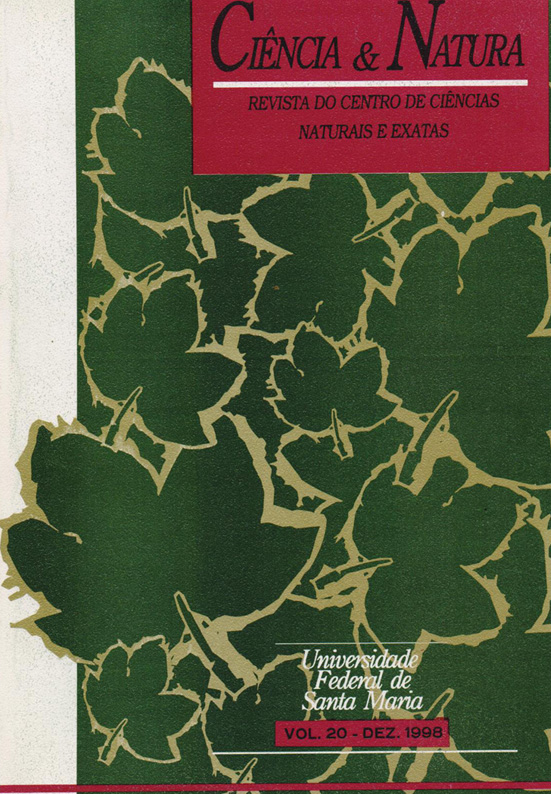Avaliação ambiental dos resíduos produzidos pelas empresas metalúrgicas localizadas no perímetro urbano da cidade de Ijuí
DOI:
https://doi.org/10.5902/2179460X26821Palavras-chave:
Resíduos Industriais, Diagnóstico Ambiental.Resumo
Este trabalho teve como objetivo, avaliar os tipos e as quantidades de resíduos produzidos pelas empresas metalúrgicas da cidade de Ijuí. A relação das 78 empresas metalúrgicas foi extraída do Cadastro dos Tirbutos Municipais/96, fornecidos pela Secretaria de Indústria, Comércio e Turismo de Ijuí, no entanto apenas 40 empresas foram avaliadas. As restantes foram fechadas (14) ou não foram localizadas (24). A avaliação foi realizada através de questionário aplicado in loco, no período de junho/96 a fevereiro/97. Os dados numéricos, referentes as quantidades de resíduos representam, um valor médio mensal estimado pelas empresas. Os resíduos produzidos em maior quantidade são: metais, areia de fundição, papel de escritório e resíduos de refeitório. A quantidade total de resíduos produzidos é de 48.809kg/mês, sendo que 14.711kg/mês é reciclado. Os resíduos encaminhados para reciclagem eram vendidos, reciclados pela empresa, ou ainda, doados. Os resíduos não recíclados (34.098 kg/mês) eram depositados em terrenos baldios, queimados ou enviados ao depósito municipal. A areia de fundição, resíduo produzido em maior quantidade , não está sendo mais produzida; neste caso a quantidade total de resíduos produzidos passa para 18.809kg/mês, com um percentual de reciclagem de 78%.Downloads
Referências
ASSOCIAÇÃO BRASILEIRA DE NORMAS TÉCNICAS. Resíduos Sólidos, NBR 10004. Rio de Janeiro: ABNT, 1986. 63p.
FUNDAÇÃO ESTADUAL DE PROTEÇÃO AMBIENTAL. Licença de Operação LO N°2607/96-DL. Ijuí: FEPAM/IMASA, 1996.
IJUÍ. Secretaria de Indústria, Comércio e Turismo de Ijuí. Cadastro de Tributos Municipais. Ijuí, 1996.
IJUÍ. Prefeitura Municipal. LEI MUNICIPAL Nº 2.085/85, de 7 de Junho de 1985. Ijuí, 1985.
IJUÍ. Ministério Público Do Rio Grande Do Sul. Promotoria de Justiça. Procedimentos Administrativos. Ijuí, 1993/1996.
LIMA, L. M. Q. Tratamento do lixo. São Paulo: Hemus, 1991.
RIO GRANDE DO SUL. Lei Estadual Nº 9.921, de 27 de Julho de 1993. Diário Oficial, Porto Alegre, 28 de Julho de 1993. N. 142, p. 1-2.
REICHARDT, F. L, DHEIN, R. A. Um Histórico da "Agropecuária Conservacionista do Solo" em Ijuí - RS. Ijuí: Ed. UNIJUÍ, 1990. 73 p. (Coleção Centenário de Ijuí; 8).
WEBER, R.. Os inícios de industrialização em Ijuí. Ijuí: Ed. UNIJUÍ, 1987. 190 p. (Coleção Centenário de Ijuí; 1).
Downloads
Publicado
Como Citar
Edição
Seção
Licença
Para acessar a DECLARAÇÃO DE ORIGINALIDADE E EXCLUSIVIDADE E CESSÃO DE DIREITOS AUTORAIS clique aqui.
Diretrizes Éticas para Publicação de Revistas
A revista Ciência e Natura está empenhada em garantir a ética na publicação e na qualidade dos artigos.
A conformidade com padrões de comportamento ético é, portanto, esperada de todas as partes envolvidas: Autores, Editores e Revisores.
Em particular,
Autores: Os Autores devem apresentar uma discussão objetiva sobre a importância do trabalho de pesquisa, bem como detalhes e referências suficientes para permitir que outros reproduzam as experiências. Declarações fraudulentas ou intencionalmente incorretas constituem comportamento antiético e são inaceitáveis. Artigos de Revisão também devem ser objetivos, abrangentes e relatos precisos do estado da arte. Os Autores devem assegurar que seu trabalho é uma obra totalmente original, e se o trabalho e / ou palavras de outros têm sido utilizadas, isso tem sido devidamente reconhecido. O plágio em todas as suas formas constitui um comportamento publicitário não ético e é inaceitável. Submeter o mesmo manuscrito a mais de um jornal simultaneamente constitui um comportamento publicitário não ético e é inaceitável. Os Autores não devem submeter artigos que descrevam essencialmente a mesma pesquisa a mais de uma revista. O Autor correspondente deve garantir que haja um consenso total de todos os Co-autores na aprovação da versão final do artigo e sua submissão para publicação.
Editores: Os Editores devem avaliar manuscritos exclusivamente com base no seu mérito acadêmico. Um Editor não deve usar informações não publicadas na própria pesquisa do Editor sem o consentimento expresso por escrito do Autor. Os Editores devem tomar medidas de resposta razoável quando tiverem sido apresentadas queixas éticas relativas a um manuscrito submetido ou publicado.
Revisores: Todos os manuscritos recebidos para revisão devem ser tratados como documentos confidenciais. As informações ou ideias privilegiadas obtidas através da análise por pares devem ser mantidas confidenciais e não utilizadas para vantagens pessoais. As revisões devem ser conduzidas objetivamente e as observações devem ser formuladas claramente com argumentos de apoio, de modo que os Autores possam usá-los para melhorar o artigo. Qualquer Revisor selecionado que se sinta desqualificado para rever a pesquisa relatada em um manuscrito ou sabe que sua rápida revisão será impossível deve notificar o Editor e desculpar-se do processo de revisão. Os Revisores não devem considerar manuscritos nos quais tenham conflitos de interesse resultantes de relacionamentos ou conexões competitivas, colaborativas ou outras conexões com qualquer dos autores, empresas ou instituições conectadas aos documentos.






